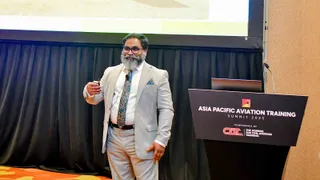Human Factors Conference
Contact Our Team
For more information about how Halldale can add value to your marketing and promotional campaigns or to discuss event exhibitor and sponsorship opportunities, contact our team to find out more
The Americas -
holly.foster@halldale.com
Rest of World -
jeremy@halldale.com

Chris Long reports from the recent Human Factors Conference held by Lufthansa Flight Training.
The importance of human behaviour within aviation, and particularly on the flight deck, has long been recognised. This critical component has never been more closely examined than as a consequence of accidents and incidents, and Lufthansa Flight Training recently organised a Human Factors Conference at its Training and Conference Center at Seeheim, some 35 minutes from Frankfurt airport.
Update
This conference was a timely update on the most up to date research on the subject, with several well-known accidents cited in which Human Factors had played a significant part. Alongside that, a summary of earlier hierarchical relationships on the flight deck, and the limiting effects it had on crew cooperation, were highlighted. With this background clearly established, several views on the challenges which exist for both present and future operations were aired.
Results of research by regulators (FAA and EASA) and research centres (NASA Ames) provided concrete data on issues of automation, generational characteristics and training systems, with the aim of helping to identify how to adapt to those. A key element was the recognition that the workload of a pilot is now much greater than for an earlier generation. The need for the “old” handling skills is as fundamental as ever, and these cannot be allowed to degenerate. But, in addition, it is essential that there is the knowledge of and, importantly, the thorough understanding of, all the aids to operation which have so dramatically enhanced safety. That technology certainly supports improved performance, but comes with its own challenges, in particular the understanding of mode selection and reversion when moving from routine operation.
Challenges
What became apparent was the extremely challenging task of retaining the competencies of an earlier generation of pilots, whose capabilities of enhanced situational awareness and resilience in the face of unexpected events are well-recognised, whilst coupling these with the ease with which a later generation can operate in a highly-automated environment. The concept of the crew as a team rather than as two individuals with separate roles is nothing new, but ways of training those teams to work together to best effect is an area of work-in-progress.
The topic of fatigue is a sensitive one, where the relationships between regulators, airlines and unions often show what could be classified, at the very least, as tension. What is frequently missing from this discussion are some hard facts stemming from objective research.
One presentation addressed just that - and the hard data was extremely interesting - and there were some excellent take-aways for those who wanted to learn. The difficulty of identifying all the elements having a bearing on an accident was also illustrated, as well as the reality that often similar events had been played out before an accident, but that the lessons learnt were not always promulgated efficiently. In an ideal world even uncomfortable lessons should be shared with the global community.
The intensity with which the study of Human Factors is being prioritised shows just how important that understanding is. Calibrating the much-increased range of skills which a current and future pilot has to master is daunting; even more challenging is the design of a training pattern which fosters those skills.
The concept that everything cannot be delivered solely during ab initio training, but that the training must continue throughout the entire career of a pilot may be self-evident, but as total experience levels in the cockpit drop as the boomer generation retires, it means that a much more deliberate transfer of experience must be planned. We can no longer rely on knowledge being passed on through assimilation and example (experience). The training patterns themselves must nurture a distillate of experience formerly held by a now-retiring pilot population. We need to create a long-term and holistic training process which produces the “Cockpit Leader” who has “Confident Humility”.


